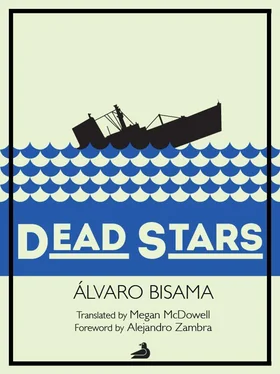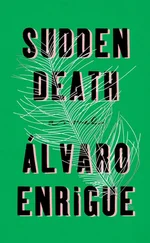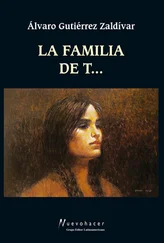That was the last time I saw them, she said. After that, they were just rumors to me, they spoke with other people's voices, they became echoes.
Until now, I said. Until now, she said, and she called the waiter over and ordered two more coffees. I checked the time. Twelve o'clock. We hadn't done any of the things we needed to do. She'd been telling that story and I had barely interrupted. Now she was sunk into silence. On the walls, the ships went on sinking. She took a sip of hot coffee. I thought she had burned her mouth. Then she closed her eyes. She opened them a second later. I had seen this gesture a thousand times. She was catching her breath, trying to understand that photograph like a person unraveling a mystery. But from her face, it seemed more like a door that had opened onto an abyss. She asked me: Were we ever happy together?
I bit my lips. I pulled more and more skin off of my lower lip and I told her: Yes, we were happy. Then we got tired of that, of being happy.
She said: I heard they moved to La Ligua before the little girl was born. To Javiera's sister's house. Donoso got a job at a supermarket. The child was born healthy in the general hospital. I didn't go see them. I had an exam. I don't know if we were still friends by that point, she said. Javiera stayed in that house: she took care of the baby and her sister's kids, too. Donoso worked. We stopped hearing from them. I graduated. I met you, she said. I never told you much about them. Javiera had gone back to the Party, she was active in the La Ligua cell. Donoso went from one low-paying job to another. The hotel was as disgusting as ever. A classmate died in a motorcycle accident and I expected to see them at the funeral, but they didn't show up, she said. Sometimes we would get news: Donoso would send his regards and ask us to come see the baby. According to these people, he looked good. He didn't talk much about Javiera. He insisted that she was still doing her thing. There was some truth to that: one of those years, Javiera was a Party candidate for city council in La Ligua. Life can correct itself sometimes, it can get back on course. That year I looked at the electoral results. She got thirty votes. That was the number: thirty votes. No one expected her to win. No one expected her to get any more than that. I wondered if she had campaigned, if the Ramona Parra Brigade had graffitied her name in the streets around town. I wondered what Donoso would say about all that. Later, Javiera told someone she wanted to go back to the university. I never found out if she did. I had stopped seeing almost everyone. They disappeared. I forgot. I guess they all forgot about me, too, she said. I fantasized about that, about being a blurry shadow in people's lives. But every once in a while, someone would tell me things about them. And I listened to their news, even though that world didn't matter to me anymore, she said. They'd say: Donoso didn't say hi to me, he pretended he didn't know me. Later, someone told me they'd seen him holding hands with another girl. But that same person assured me that Donoso and Javiera were still a couple. These contradictory reports stopped after someone told me they had broken up, that they were no longer together, she said. These reports stopped suddenly in 1998, the year Donoso took the two-year-old girl, got on a bus again, and fled with her to Antofagasta. Around that same time, the decade came to end. Around that same time, they arrested Pinochet in London.
She said: You remember what we did when they arrested Pinochet in London? Yes, I said. We spent the entire night fucking like rabbits, I said.
Her: I didn't tell you about any of this because you wouldn't have been interested, but during the first few years we were together, sometimes I thought about Donoso's trip up north with the little girl. I imagined a father on a bus in the middle of the desert, that little girl looking out the window at the flatlands, while he closed his eyes and imagined a future in that dead expanse. I fantasized that it was over, that it all ended there, that I would never hear about them again, I would never again think about that hotel where Javiera lay resting in a dark room. The desert was the future, and the empty, dry horizon promised a place where time, frozen now, would start back up again. Years later, a guy from school told me that according to Javiera, things with Donoso had broken down right after they moved to La Ligua. That he'd felt hurt when she went back to the Party, when she asked them for forgiveness and they took her back. That same classmate told me that for Donoso, life in La Ligua was monotonous: the TV channels didn't come in very well, he felt out of place in the house of that sister-in-law who hated him, he would sit looking out at the field full of avocado trees. Donoso told the classmate that was why he'd had no problem cheating on Javiera, no problem getting involved with a girl from an English class he was taking. Javiera had found out and stopped speaking to him. She wandered the streets, drank beer in the village taverns. Donoso realized that the little girl was often home alone. One night, they had an argument, she said. Javiera threatened him with a knife. He decided to take his daughter and get out of there, she said. He decided to run away. The countryside was suffocating him, killing him. Donoso told this classmate that he thought about going back to Valparaíso, but he decided against it. He had escaped from there. He didn't want to see the dead Sunday streets ever again in his life, he didn't want to feel the freezing spring wind on his cheeks. From the squalid bus terminal in La Ligua, he called his mother in Antofagasta. He told her he was coming and bringing the child. Donoso's mother didn't know she had a granddaughter. She found out just then. Come on home, she said.
Javiera stayed in La Ligua. I never heard anything else about her until now. I can't put myself in her shoes, imagine her sorrow. Things get to a point where you can't put yourself in someone else's place. When you can't understand anything, she said. I don't know what she's done all these years. I don't know how she faced the fact that Donoso had taken the girl. I don't know how someone can live with a thing like that. The century ended. The world didn't. Nothing exploded. I suddenly forgot almost all of the past decade. There was you. There was all this, she told me. Then that fell apart, too, but by then we were used to getting knocked around, we were already damaged, grown old. And here we are; we walked into this café and we turned into those reflections, those photos of something sinking.
But we aren't those reflections, I said. Even though we're here, torn apart, tearing each other apart, I said.
She said: No. We aren't. We're the black sea in those photos. The dirty surface of the ocean that everything sinks into. That's what we are.
She said: The last I heard of Javiera was from a classmate I saw at a party. You were there, but you didn't notice anything. In a minute, half a minute, half a second, someone can tell you another person's whole life. She had run into Javiera at a party held at the community radio station, in the port. Javiera was wasted. She tried to hook up with a guy, but he ignored her. Then she talked to my classmate about Donoso, how much she missed him, how she was going to get her man back. She said that she still needed him, that she had already forgiven him. That's what she said. My classmate told me the conversation only lasted a second, and then Javiera went off to dance, she went back to the party. The classmate stayed with her friends. Before she left, she saw Javiera with her arms around a punk guy. Javiera was kissing him and he was laughing. The punk was twenty years old at most, with a mohawk bleached blonde with hydrogen peroxide, she said. That was the last thing anyone told me about them. What do you think?
Читать дальше





![Джеймс Чейз - Safer Dead [= Dead Ringer]](/books/430347/dzhejms-chejz-safer-dead-dead-ringer-thumb.webp)






